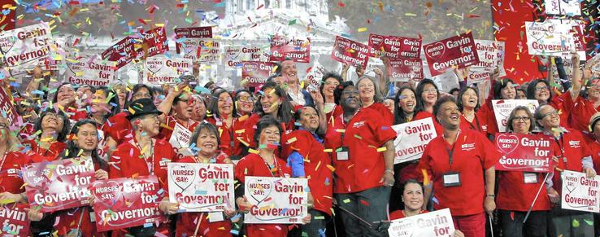News
How Gavin Newsom Keeps Getting Ahead of the Pack

Two things were evident amid the fusillades of confetti and extended glad-handing at last week's endorsement of gubernatorial candidate Gavin Newsom by the politically powerful California Nurses Association.
One was the importance of timing. The other was the impact of vengeance.
It looked, as the lieutenant governor said, like an election night celebration — a hotel ballroom littered with bits of paper lofting skyward, shrieks of approval at everything Newsom said, 35 minutes of adulation and picture-taking from the mostly female audience he waded into after his speech.
And all for a race that will not be decided until November 2018.
Right after those theatrics, however, the matter of timing arose in the most horrific way, as news spread of the mass shooting at a holiday party in San Bernardino. As Newsom spoke to reporters, authorities in the Inland Empire desperately searched for the attackers.
"What more evidence do you need that we need to step it up as it relates to gun safety in the state?" Newsom asked. "It's just unacceptable what's going on in this country, and California needs to lead the way. … Today's tragedy just reinforces the imperative to not wait around for Congress to do their job — but for this state to do its job."
By that he meant approving a measure he's pushing for the 2016 ballot that would, among other things, outlaw possession of large ammunition magazines and require background checks on any ammunition. He announced the measure one month ago.
Newsom's political image has been built on taking early and controversial positions, as he did with his support for same-sex marriage at a time most Democratic elected officials ran from it, and then seeing events confirm his view. When it came to marriage equality, confirmation came in the Supreme Court's validation of the right 11 years after Newsom pushed it as mayor of San Francisco.
When it comes to guns, Wednesday's bloodshed potentially positioned Newsom ahead of the pack again. And again it was on an issue that will put Newsom in the ring with moneyed opponents — in this case the National Rifle Assn. On Friday, in an early demonstration, he sent out a fundraising pitch blistering Congress for spurning new gun measures in deference to the NRA.
Aggressively confronting an enemy like that is, in political terms, not a bad place to be in a Democratic state as the 2018 election nears. (The alternative came via Atty. Gen. Kamala Harris, a candidate for U.S. Senate in 2016, who demonstrated far more caution. She waited a day to issue a statement that simply highlighted her office's plan to work with authorities and offered prayers for the victims, saying nothing about guns or terrorism.)
If the gun control measure makes the November ballot and wins, Newsom would be in the spotlight — and on the side of a majority of voters — just as attention turns to the 2018 races. That sort of timing is advantageous, and only partly in a candidate's control.
So is vengeance on the part of allies. That, too, surfaced at the nurses-Newsom love fest.
In an interview after the event, RoseAnn DeMoro, executive director of the association, was blunt. Yes, the group loves Newsom, in large part because as mayor he pushed and signed into existence universal healthcare for city residents. His support for raising the minimum wage statewide and his gay-rights stance also appeals to the group.
But in making their exceedingly early endorsement, the nurses were sending a message to a potential Newsom opponent, former Los Angeles Mayor Antonio Villaraigosa. Like other labor groups, the nurses have not forgiven him for his battles with teachers unions.
"Extremely disappointed in him. He violated our trust," DeMoro said of Villaraigosa. "For us it goes to character. You have to be consistent. He has violated our trust."
Substantial numbers of voters — and wealthy donors — side with Villaraigosa on education and pension reform, the issues that angered organized labor. But the nurses group has repeatedly demonstrated its statewide power, playing a huge role in quashing Gov. Arnold Schwarzenegger's proposed budget measures and later tormenting the 2010 Republican candidate for governor, Meg Whitman.
The field is far from set; Newsom is the only announced candidate. Besides Villaraigosa, state treasurer John Chiang, billionaire Democratic donor Tom Steyer and former gubernatorial candidate Steve Westly are looking at running. The nurses had a message for them, too.
"I think it would be foolish of anyone on the progressive side to get in" and challenge Newsom, DeMoro said, calling the lieutenant governor "a natural progression from Jerry Brown."
"Jerry stabilized the state," she said, "and Gavin will build on that, in a very dramatic way."
He may not, of course. Newsom may be "bold, bold, bold," as DeMoro put it, but Californians sometimes shy from that. They tend to lean instead to the candidate they see as best apt to keep the state on the right track.
In Brown, the state now has a governor who has seemed to crack the code. His effort to force the state budget process into something resembling normalcy — without the theatrics of his predecessor, Schwarzenegger — has made him popular despite his affection for askance pursuits like the bullet train.
With a presence that hews toward drama and a policy bent, Newsom seems intent on essentially synthesizing the two approaches. Mark Baldassare, the executive director of the Public Policy Institute of California, noted that a poll it released last week showed competing voter desires for experience and freshness.
"What might be appealing about him, at this part of the political cycle, is that he's kind of a combination of both of those things," Baldassare said.